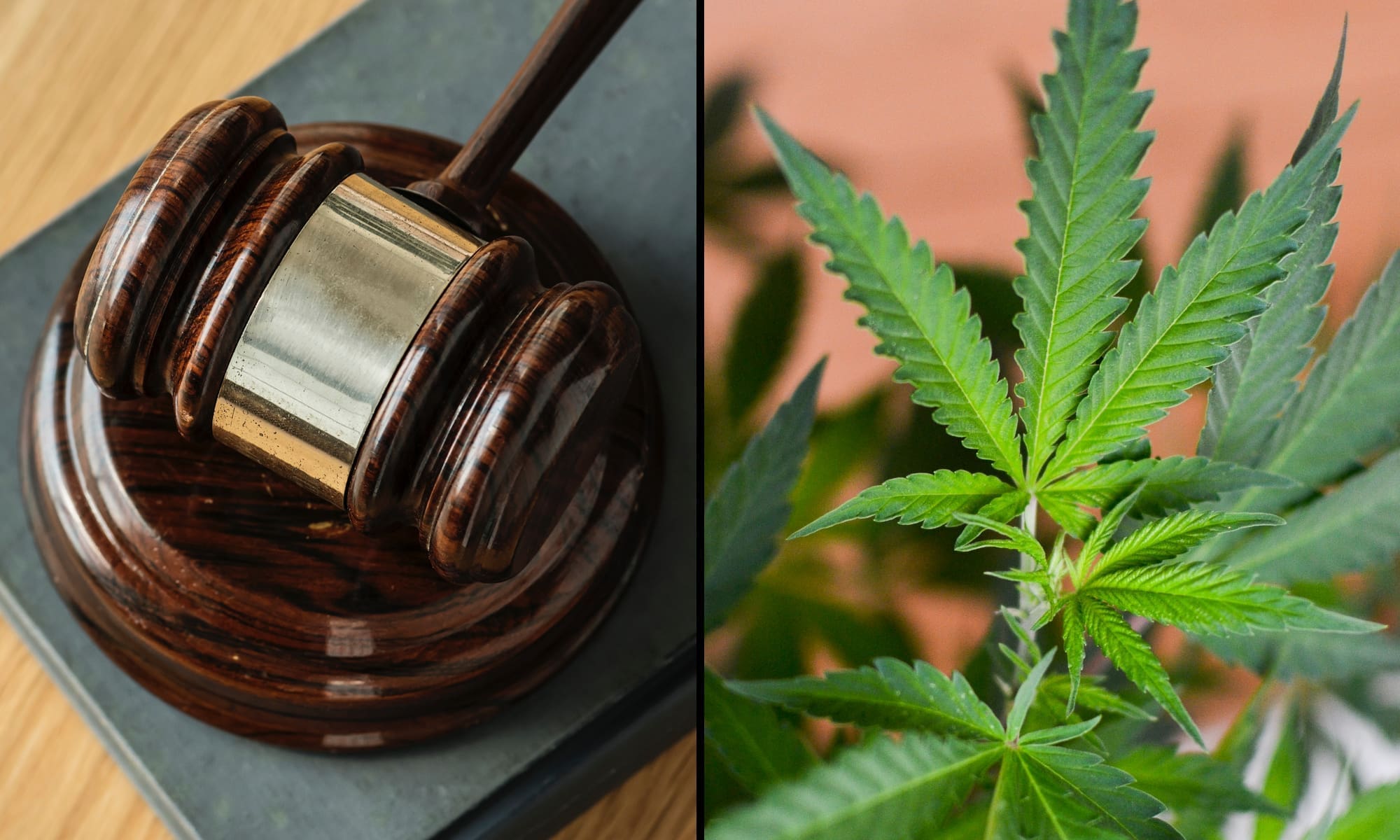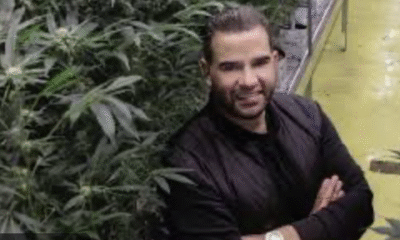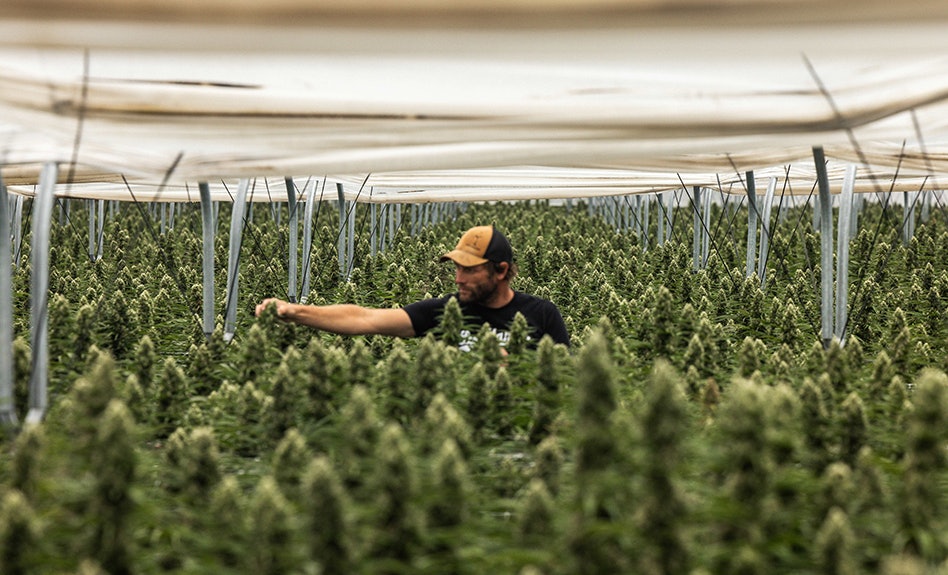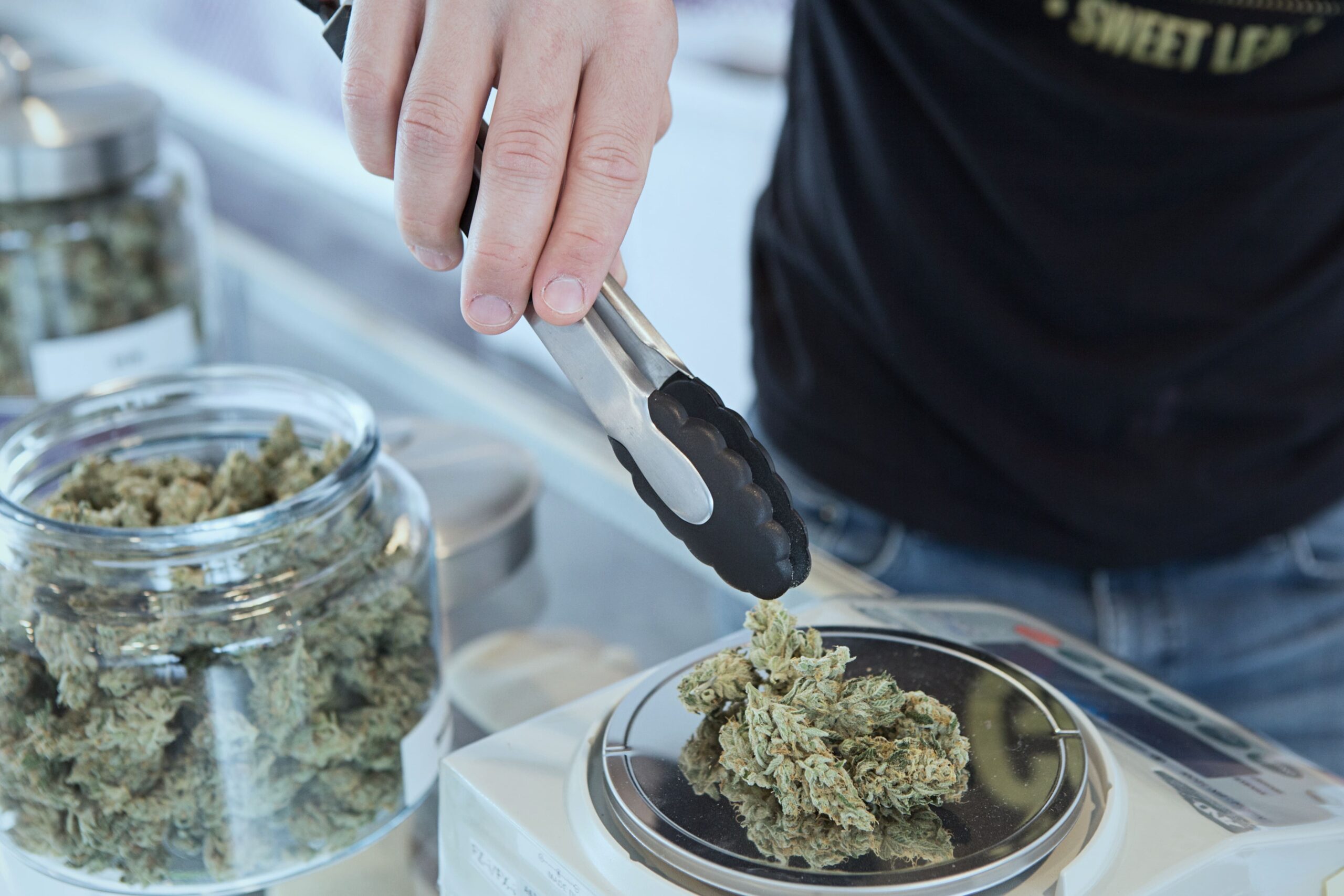featured
Florida Marijuana Legalization Campaign Sues State Over Alleged ‘Unlawful’ Attempt To Invalidate 200,000 Signatures For 2026 Ballot Initiative
Published
1 day agoon

A Florida campaign that’s working to put a marijuana legalization initiative on the 2026 ballot is suing the state for allegedly taking “unlawful” steps to force the invalidation of about 200,000 voter signatures it has submitted.
Smart & Safe Florida filed the lawsuit against Secretary of State Cord Byrd and Leon County Supervisor of Elections Mark Earley in Florida’s Second Judicial Circuit last week, contesting the secretary’s claims that signature verification criteria render invalid any petitions that didn’t include the full text of the initiative.
Such a rule was “not contemplated by the statute” on ballot requirements, the campaign said. Despite that, however, the secretary earlier this month “directed all County Supervisors of Elections to invalidate upwards of 200,000 of Plaintiff’s petitions that the Supervisors had previously verified pursuant to the express statutory criteria.”
A campaign spokesperson told Marijuana Moment on Monday that the lawsuit is meant to “require the Secretary of State to follow Florida law and to prevent the State from denying the Florida voters who signed the petitions to have their voices heard.”
“We are asking the court to enforce Florida law, it’s really that simple,” they said. “The State is wrongly attempting to change the rules after-the-fact and deny these registered voters their voice in the process.”
The lawsuit, first reported by Politico, notes that the secretary’s decision to direct the invalidation of petitions comes “less than four months before the February 1, 2026, deadline for ballot certification.”
The secretary’s office initially sent a cease-and-desist letter to Smart & Safe Florida in March, advising the campaign about its interpretation of the rules around including the full text of the proposed initiative on its signature petitions, “without pointing to any statute, regulation, or order” to support its enforceability.
“While the Secretary has the delegated authority to prescribe the style and requirements of a citizen initiative form, he has no authority to create and impose additional verification criteria not contemplated by the Legislature,” the suit says. “No Florida statute…expressly or impliedly requires that the Full Text Form be provided or displayed to a voter prior to signing a petition.”
Regardless of legal questions surrounding the revised signature gathering criteria, the campaign did voluntarily comply with the secretary’s directive and began including the full text on petitions. But more than six months after the initial contact, Division of Elections Director Maria Matthews on October 3 emailed all of the state’s 63 county supervisors “directing them to invalidate any Smart & Safe petition” that voters signed before the full initiative text was added.
“While the Secretary may wish that voters have the opportunity to read the Full Text Form before signing the petition, there is no statutory or regulatory requirement that a voter read the full text to have their petition verified and counted,” the lawsuit says. “The Secretary’s Directive is inaccurate, unlawful, ultra vires, and void.”
“Because of the Secretary’s Directive, Smart & Safe is in doubt as to its rights and responsibilities as the sponsor of the Proposed Amendment,” it added.
The campaign is asking the court to affirm the lack of legal authority for the secretary to “impose additional verification criteria” for petition signatures, enjoin the state from “invalidating otherwise valid petitions” under the secretary’s directive, restore the validation of petitions that were allegedly unlawfully invalidated and provide any other relief deemed necessary.
Beyond the legal challenge to the signature criteria, there’s another curious wrinkle in how the state has so far navigated this initiative, with the secretary of state apparently missing a statutorily imposed deadline to submit the measure to the Florida Supreme Court for a legal review after it met an initial threshold of 220,016 valid signatures.
According to the state Division of Elections, Smart & Safe Florida has collected valid 662,543 signatures at last count. It needs 880,062 verified signatures by February 1, 2026 to make the ballot. In June, the state affirmed that the campaign collected enough for the initiative to trigger the fiscal and judicial review.
This is the campaign’s second run at the ballot. They successfully secured ballot placement for a 2024 version of the initiative–and a majority did vote to pass it, but not enough to meet the state’s steep 60 percent threshold to approve a constitutional amendment.
With approximately 200,000 petitions now potentially at risk of invalidation, and limited time to make up the difference, the campaign may be at jeopardy if the court upholds the state’s authority to impose new signature criteria.
In the background of this lawsuit, a federal judge in August delivered a win to Smart & Safe Florida—granting “complete relief” from provisions of a law Gov. Ron DeSantis (R) signed to impose other serious restrictions on signature gathering.
While the law DeSantis signed in May wasn’t directly targeted at the cannabis initiative, there’s been concern among supporters that it could jeopardize an already complex and costly process to collect enough signatures to make the ballot. That’s because it would block non-residents and non-citizens from collecting signatures for ballot measures.
In March, meanwhile, two Democratic members of Congress representing Florida asked the federal government to investigate what they described as “potentially unlawful diversion” of millions in state Medicaid funds via a group with ties to DeSantis. The money was used to fight against a citizen ballot initiative, vehemently opposed by the governor, that would have legalized marijuana for adults.
The lawmakers’ letter followed allegations that a $10 million donation from a state legal settlement was improperly made to the Hope Florida Foundation, which later sent the money to two political nonprofits, which in turn sent $8.5 million to a campaign opposing Amendment 3.
A grand jury is now reportedly taking testimony on that matter ahead of potential prosecutions.
The governor said in February that the newest marijuana legalization measure is in “big time trouble” with the state Supreme Court, predicting it will be blocked from going before voters next year.
“There’s a lot of different perspectives on on marijuana,” DeSantis said. “It should not be in our Constitution. If you feel strongly about it, you have elections for the legislature. Go back candidates that you believe will be able to deliver what your vision is on that.”
“But when you put these things in the Constitution—and I think, I mean, the way they wrote, there’s all kinds of things going on in here. I think it’s going to have big time trouble getting through the Florida Supreme Court,” he said.
The latest initiative was filed with the secretary of state’s office just months after the initial version failed during the November 2024 election—despite an endorsement from President Donald Trump.
Smart & Safe Florida is hoping the revised version will succeed in 2026. The campaign—which in the last election cycle received tens of millions of dollars from cannabis industry stakeholders, principally the multi-state operator Trulieve—incorporated certain changes into the new version that seem responsive to criticism opponents raised during the 2024 push.
For example, it now specifically states that the “smoking and vaping of marijuana in any public place is prohibited.”Another section asserts that the legislature would need to approve rules dealing with the “regulation of the time, place, and manner of the public consumption of marijuana.”
—
Marijuana Moment is tracking hundreds of cannabis, psychedelics and drug policy bills in state legislatures and Congress this year. Patreon supporters pledging at least $25/month get access to our interactive maps, charts and hearing calendar so they don’t miss any developments.![]()
Learn more about our marijuana bill tracker and become a supporter on Patreon to get access.
—
Last year, the governor accurately predicted that the 2024 cannabis measure from the campaign would survive a legal challenge from the state attorney general. It’s not entirely clear why he feels this version would face a different outcome.
While there’s uncertainty around how the state’s highest court will navigate the measure, a poll released in February showed overwhelming bipartisan voter support for the reform—with 67 percent of Florida voters backing legalization, including 82 percent of Democrats, 66 percent of independents and 55 percent of Republicans.
However, the results conflict with another recent poll from the Florida Chamber of Commerce, a proactive opponent of legalization, that found majority support for the reform among likely voter (53 percent) but not enough to be enacted under the 60 percent requirement.
Another poll of Florida Republican voters showed just 40 percent of that demographic said they’d vote in favor of the legalization proposal.
Separately, a Florida GOP senator claimed recently that the legalization campaign “tricked” Trump into supporting the 2024 measure by misleading him and the general public about key provisions.
Ahead of the election, Trump said last September that he felt Amendment 3 was “going to be very good” for the state.
Before making the comments, Trump met with the CEO of Trulieve, Kim Rivers, as well as with a GOP state senator who is in favor of the reform.
Meanwhile, Florida medical marijuana officials are actively revoking the registrations of patients and caregivers with drug-related criminal records. The policy is part of broad budget legislation signed into law earlier this year by DeSantis. The provisions in question direct the state Department of Health (DOH) to cancel registrations of medical marijuana patients and caregivers if they’re convicted of—or plead guilty or no contest to—criminal drug charges.
Read the Smart & Safe Florida campaign’s lawsuit against the state over petition criteria below:

Author: mscannabiz.com
MScannaBIZ for all you Mississippi Cannabis News and Information.
You may like
-


Raw Garden Acquires ‘California Love’ to Grow Clean Cannabis Movement
-


Rhode Island Marijuana Officials Approve Timeline For Awarding New Dispensary Licenses
-


‘Rent-a-License’ Scheme Highlights New York Cannabis’s Track-and-Trace Problem
-


Alcohol Industry Steps Up Lobbying On Hemp Drinks As Congress Debates THC Ban
-


Cannabis Mogul Appointed Ambassador To Middle East Country
-


Pennsylvania Senators Approve Bipartisan Cannabis Bill To Create New Regulatory Body
featured
Raw Garden Acquires ‘California Love’ to Grow Clean Cannabis Movement
Published
35 minutes agoon
October 21, 2025
[PRESS RELEASE] – SANTA BARBARA, Calif., Oct. 21, 2025 – Raw Garden, California’s leader in clean cannabis for more than a decade, announced the acquisition of the California Love cannabis brand in a move focused on increasing access to clean and safe cannabis across the state. The deal comes as part of Raw Garden’s highly selective approach to growth and partnerships, rooted in the ethos of supporting small, values-aligned farms that are connected to their communities and meet their highest standards.
Founded in 2015, Raw Garden has been a part of the Clean Green Certification Program since the beginning. The company remains committed to testing for hundreds of pesticides and potential contaminants, far more than the 66 currently required by the state, and offers 100% transparency by publishing all results on its website. Earlier this year, Raw Garden also helped launch ECCO (Environmentally Conscious Consumer Organization), because the cannabis industry needed a higher standard – one built on safety, purity and sustainability.
For Raw Garden, clean isn’t just a buzzword; it’s an obsession. Every farm and facility undergoes rigorous compliance checks to ensure that when you choose Raw Garden, you’re choosing clean, contaminant-free cannabis every time.
“The purchase of California Love will expand the clean cannabis movement as well as serve as inspiration for others who want to make the switch to clean farming practices,” Raw Garden CEO Thomas Martin said. “We are excited about the growth we have seen with California Love, and the goal with this purchase is to provide easier access for people who want clean, pure cannabis flower.”
Based in Grover Beach, California Love is currently available in more than 130 retailers throughout the state. Going forward, the brand will be subject to the same rigorous standards as Raw Garden and undergo the same third-party testing to ensure consumers of both brands enjoy the same clean quality and attention to detail.
“For us, the certifications aren’t just a badge; they’re a reflection of our obsession with clean cannabis,” Raw Garden Vice President of Manufacturing Mickey Esdale said. “From our oil-based vapes to our flower, every product is held to the highest standard, because purity should never be optional. We don’t just meet industry standards; we push them forward. Our customers deserve full transparency and the confidence that what they’re smoking is as clean and sustainable as it gets.”

Author: mscannabiz.com
MScannaBIZ for all you Mississippi Cannabis News and Information.
featured
Rhode Island Marijuana Officials Approve Timeline For Awarding New Dispensary Licenses
Published
2 hours agoon
October 21, 2025
“We reserve the right to delay this process depending on several external factors outside our control. For example, if we receive thousands of applications, it will be hard for us to do that.”
By Christopher Shea, Rhode Island Currant
Rhode Island’s cannabis regulators could begin awarding new retail licenses to prospective business owners eager to join the state’s budding market as early as May 2026.
That’s according to a timeline the Cannabis Control Commission voted 2-1 to adopt on Monday. The timeline sets the pace for officials to review applications for the state’s 24 available retail licenses after the application deadline on December 29, 2025.
“It’s clear to me that we need to do a better job forecasting what the next months look like after the application portal closes at the end of this calendar year,” Commission Chairperson Kimberly Ahern said. “We have never shared what 2026 held.”
Starting January 1, 2026, the state’s Cannabis Office will have 90 days to review applications and verify that each meets eligibility qualifications before being placed in a lottery. The timeline builds in at least 60 days to allow applicants to secure approvals at the local level in order to qualify for random selection, Ahern said.
Ahern said the intention is to begin the lottery selection process in the second quarter of 2026, likely in May.
“I want to add that we reserve the right to delay this process depending on several external factors outside our control,” Ahern said. “For example, if we receive thousands of applications, it will be hard for us to do that.”
As of Monday, no retail applications have been submitted to the state’s cannabis office, spokesperson Charon Rose told Rhode Island Current after the meeting.
Objections on getting ducks in a row
Commissioner Robert Jacquard, the lone vote against regulators’ review timeline, argued that allowing businesses to secure local zoning approvals after the application deadline is unfair to those who met the requirements on time.
“If an applicant is better prepared, better financed, got an earlier start, I think that’s important,” he said. “We have had our regulations out for a good amount of time, people were well-warned that there would not be any extensions beyond the deadlines that were set.”
Those same feelings were shared by many of the members of Rhode Island’s cannabis industry who attended the meeting within the Public Utilities Commission’s office building in Warwick.
“Many of us have invested significant time and money securing compliant locations, paying for rent, purchasing properties, and obtaining special use and zoning permits,” Karen Ballou, owner of CultivatingRI, told commissioners. “I recognize some municipalities have made it difficult for applications to meet certain requirements, but that should not penalize those who have successfully navigated the process.”
Business owners awarded medical cannabis licenses have faced setbacks opening in Woonsocket and Foster amid disputes with local officials and property owners, causing them to miss the state’s initial nine-month deadline to begin operations.
And not every town is willing to have a cannabis retailer. In 2022, voters in six communities—Barrington, East Greenwich, Jamestown, Little Compton, Scituate and Smithfield—rejected allowing retail pot shops within their borders.
Ballou said if regulators really need to give some applicants more time to get all their needed material together, those businesses should be subject to a second lottery.
Sasha Gorski, co-owner of the cultivation company Talaria, agreed, saying the 60-day window to secure local zoning permits after the application deadline shouldn’t apply to general retail applicants.
“It hurts to be punished for being ahead,” she said.
But others in the room argued the commission’s review timeline helps to create a sense of fairness as the retail industry starts to grow in Rhode Island.
“Applicants need breathing room to go through the proper channels,” Emma Karnes, an organizer for United Food and Commercial Workers Local 238, told the commission. “I think we all want a healthy pool of applicants. We all want a reasonably accessible application process.”
Karnes said many applicants seeking social equity and worker cooperative licenses may not have the same resources and capital as other prospective business owners. Such is the case for Alexa Goodrich-Houska, who is seeking to open the Living Room Cannabis Cooperative somewhere in Zone 1, which includes the communities of Burrillville, Cumberland, Glocester, North Smithfield, Smithfield and Woonsocket.
“We don’t have trust funds, we don’t have big corporate backers,” Goodrich-Houska said. “Documentation alone can take four to 12 months and around $50,000 to know if we can even get a license.”
That’s on top of the $7,500 application fee, a yearly $30,000 licensing fee that all cannabis retailers face—though that application fee will be waived for the first year for approved social equity applicants.
Ahern acknowledged industry members’ concerns and continued frustration over new licenses not yet being issued, but reminded them it was never going to be a rubber stamp process.
“We expect a very robust, thorough process,” she said. “That was never going to be done overnight, that was never going to be done in a few weeks.”
Under the 2022 act that legalized recreational cannabis, the commission can offer 24 new licenses to retailers, with six reserved for social equity applicants and another six reserved for worker-owned cooperatives. All recreational licenses will be spread throughout six geographic zones, with a maximum of four stores per zone.
Applicants have up to 60 days to demonstrate they have final zoning approval from the municipality where they intend to operate their business—a provision Ahern said was included partly because of the commission’s slow rollout in getting potential social equity applicants certified.
The commission in late August opened the initial screening process for social equity applicants, defined as prospective retailers owned or mostly staffed by those adversely affected by the war on drugs. After the certification deadline closed on September 29, the commission reported 94 potential applicants for the state’s six social equity licenses.
Beginning Monday, screened applicants were expected to receive letters informing them if they meet the state’s social equity criteria. Prospective applicants who don’t initially meet the commission’s requirements will have 10 additional days to prove they qualify as social equity applicants.
Regulations approved by the commission earlier in the year require that social equity applicants have at least 51 percent ownership and control by individuals directly impacted by past cannabis laws or economic disparities, or a minimum of 10 full-time employees that meet the same criteria.
Qualifying factors include convictions for nonviolent cannabis offenses or residency in disproportionately impacted areas—which can be determined by federal poverty level, unemployment rate, the number of students in a free school lunch program and historic arrest rates by census tract.
Final certification is expected to be approved by the commission some time in November.

Author: mscannabiz.com
MScannaBIZ for all you Mississippi Cannabis News and Information.
featured
‘Rent-a-License’ Scheme Highlights New York Cannabis’s Track-and-Trace Problem
Published
3 hours agoon
October 21, 2025
New York cannabis regulators are attempting to oust a licensed operator from the adult-use marketplace whom they’re accusing of “aiding and abetting” in unlicensed processing activity through a reverse licensing scheme.
The state’s Office of Cannabis Management (OCM) filed multiple charges Oct. 20 against Omnium Health Inc. (d/b/a Omnium Canna), a licensed adult-use processor and distributor in Long Island.
The OCM claims that a February 2025 investigation uncovered contracts between Omnium and unlicensed operators whom Omnium charged rent, allowing them to use its facilities and resources to manufacture and package cannabis products that landed on licensed dispensary shelves as part of a “rent-a-license” scheme.
“Omnium’s alleged conduct is a blatant breach of the licensing rules designed to ensure transparency and fairness in the legal market,” OCM Executive Deputy Director Felicia A. B. Reid said in an Oct. 20 press release. “Our state’s cannabis laws are clear: Licenses are not transferable and only licensed operators may produce and distribute cannabis. OCM’s move today ensures that regulated businesses do not exploit loopholes or take advantage to undermine legal operators who play by the rules.”
In filing a notice of pleading, OCM is attempting to revoke Omnium’s licenses and prevent the company from applying for future licensure.
The state’s regulators are also seeking civil penalties related to the projected revenue from the sale or possession of any unregulated cannabis products, as well as the recall and destruction of those unregulated products.
“Omnium’s actions violated core principles of our regulatory framework and placed unvetted operators into the heart of New York’s legal market,” said Stephen Geskey, OCM deputy executive director of labs, compliance and licensing. “This is a textbook example of reverse licensure, and OCM will not tolerate it.”
The possibilities of “reverse licensure” in New York’s adult-use cannabis market are exacerbated by the state’s delay in implementing a third-party seed-to-sale tracking system nearly three years after adult-use dispensary sales launched in December 2022.
The OCM plans to integrate track-and-trace provider Metrc’s software and technology into the state’s adult-use program by Dec. 17 for all licensees. Access to Metrc’s application programming interference (API) and testing endpoints will be available on Oct. 12 for operators to begin the transition.
The majority of state cannabis programs have a third-party provider, like Metrc or BioTrack, to help prevent product diversion or inversion. Without a system in place, former New York Cannabis Control Board Member Jennifer Gilbert-Jenkins called product inversion the state’s “dirty secret” during a December 2024 board meeting.
“How are we validating that the products in stores are actually coming from New York State?” she questioned. “Because the rate of inversion in this market is the dirty secret that everybody is talking about … that the amount of product that’s coming into our legal, authorized dispensaries from out of state is displacing New York product.”
In February 2025, the OCM launched a Trade Practices Bureau dedicated to safeguarding the integrity of the state’s cannabis program through investigating violations, abuse and noncompliance to hold “bad actors” accountable.
In seeking revocation, debarment and monetary penalties against Omnium in this week’s announcement, the OCM also ordered a statewide retail recall of Omnium-linked products. In Monday’s release, the OCM included a photo of a product’s packaging labeled “Omnium d/b/a MFused.” OCM investigators concluded that MFused rented Omnium’s premises and license.
In covering the OCM’s investigation, The New York Times reported that not only is Mfused connected to Omnium, but so too are popular brands Stiiizy and Grön. The article states that Grön continues to rent space in Omnium facilities and draws attention to another article that details Grön’s business partnerships with licensees in other states.
Grön, which has a Type 2 processing license in New York, called the NYT’s article “inaccurate” in a company statement provided to Cannabis Business Times:
“We are disheartened and disappointed with the inaccurate reporting done by the New York Times today in an article that misrepresents our relationships, business practices and general code of conduct in New York. The article, about challenges facing a former partner of ours in New York State, suggests that Grön – a company with an unparalleled reputation in the cannabis industry for transparency and compliance, which are core values of our business – participated in improper licensing and manufacturing in New York State. These claims are entirely false, and we implore the New York Times to review this matter and issue a correction at once.”
An edibles brand from Oregon, Grön contests that it operates in a building completely independent of Omnium under full compliance with the OCM.
“Our relationship with Omnium was short, and during that time, Grön operated in total compliance with OCM’s regulations, which expressly permit out-of-state brands to partner with existing New York processing licensees, proving there is zero merit to any story of questionable material being used,” according to the company statement.
In February, the OCM’s newly launched Trade Practices Bureau (TPB) examined Omnium’s audit and inspection records, reviewed contracts between the company and other businesses, and interviewed several witnesses, according to the OCM.
In Monday’s notice of pleading, the OCM also accused Omnium of material misrepresentation and failing to disclose substantial changes to its business operations.
“Reverse licensing has no place in New York’s market,” TPB Director James Rogers said. “This kind of cheating robs compliant businesses of their right to compete in a fair market. Acting Executive Director Reid set up the bureau to address these kinds of threats to market integrity. The TPB team is grateful to all the individuals who came forward with crucial information and encourage others to do the same. If we work together, we can keep New York’s cannabis market above board.”

Author: mscannabiz.com
MScannaBIZ for all you Mississippi Cannabis News and Information.

Raw Garden Acquires ‘California Love’ to Grow Clean Cannabis Movement

Rhode Island Marijuana Officials Approve Timeline For Awarding New Dispensary Licenses

‘Rent-a-License’ Scheme Highlights New York Cannabis’s Track-and-Trace Problem

Alcohol Industry Steps Up Lobbying On Hemp Drinks As Congress Debates THC Ban

Cannabis Mogul Appointed Ambassador To Middle East Country

Pennsylvania Senators Approve Bipartisan Cannabis Bill To Create New Regulatory Body

Ahead Of New Jersey Governor Election, GOP Candidate’s Comments On Marijuana As A ‘Gateway Drug’ Resurface

Urgent Action Needed To End US Marijuana Arrests

Supreme Court takes up cannabis & gun rights case (Newsletter: October 21, 2025)

What Winning Looks Like: The New Jersey Dispensaries Playing a Different Game

Trump Taps Marijuana Industry ‘Visionary’ As Special Envoy To Iraq

Delaware Scam Claiming to Represent State-Licensed Dispensary Offering Illegal Cannabis Deliveries – Ganjapreneur
New York Should Legalize Psilocybin Therapy, Former Narcotics Prosecutor Says (Op-Ed)

Do Public Votes About Cannabis Matter Currently

Ohio Lawmakers Will Take Up Bill To Revise Voter-Approved Marijuana Law And Add Hemp Market Restrictions This Week

The Best Microdosing Strains For A Rough Week
Rubicon Organics Announces Health Canada Cultivation License For Cascadia Facility

Building Community, One Bagel at a Time

Supreme Court to Decide Whether Federal Gun Ban Applies to Cannabis Consumers

Florida Marijuana Legalization Campaign Sues State Over Alleged ‘Unlawful’ Attempt To Invalidate 200,000 Signatures For 2026 Ballot Initiative

Does Skateboarding Need To Level Up

Planet 13 Opens 34th Florida Dispensary in Pace

A Long Strange Trip: Yelawolf and Edward Crowe Bring Blotter Art to Life

La Crosse, WI Reduces Marijuana Possession Penalties to $1 Fine

Alert: Department of Cannabis Control updates data dashboards with full data for 2023

Connecticut Appoints The US’s First Cannabis Ombudsperson – Yes there is a pun in there and I’m Sure Erin Kirk Is Going To Hear It More Than Once!

5 best CBD creams of 2024 by Leafly

Recreational cannabis on ballot for third time in South Dakota

EU initiative begins bid to open access to psychedelic therapies
New Study Analyzes the Effects of THCV, CBD on Weight Loss

5 best autoflower seed banks of 2024 by Leafly

Free delta-9 gummies from Bay Smokes

Discover New York’s dankest cannabis brands [September 2024]

May 2024 Leafly HighLight: Pink Runtz strain

Press Release: CANNRA Calls for Farm Bill to Clarify Existing State Authority to Regulate Hemp Products

5 best THC drinks of 2024 by Leafly

Local medical cannabis dispensary reacts to MSDH pulling Rapid Analytics License – WLBT

6 best CBD gummies of 2024 by Leafly

Curaleaf Start Process Of Getting Their Claws Into The UK’s National Health System – With Former MP (Resigned Today 30/5/24) As The Front Man

Horn Lake denies cannabis dispensary request to allow sale of drug paraphernalia and Sunday sales | News

5 best delta-9 THC gummies of 2024 by Leafly

Mississippi city official pleads guilty to selling fake CBD products

The Daily Hit: October 2, 2024

Nevada CCB to Accept Applications for Cannabis Establishments in White Pine County – “Only one cultivation and one production license will be awarded in White Pine County”

5 best THCA flower of 2024 by Leafly

Weekly Update: Monday, May 13, 2024 including, New Guide for Renewals & May Board meeting application deadline

6 best hemp pre-rolls of 2024 by Leafly

PRESS RELEASE : Justice Department Submits Proposed Regulation to Reschedule Marijuana
Trending
-

 California Cannabis Updates1 year ago
California Cannabis Updates1 year agoAlert: Department of Cannabis Control updates data dashboards with full data for 2023
-

 Breaking News1 year ago
Breaking News1 year agoConnecticut Appoints The US’s First Cannabis Ombudsperson – Yes there is a pun in there and I’m Sure Erin Kirk Is Going To Hear It More Than Once!
-

 best list1 year ago
best list1 year ago5 best CBD creams of 2024 by Leafly
-

 Business1 year ago
Business1 year agoRecreational cannabis on ballot for third time in South Dakota
-

 Business1 year ago
Business1 year agoEU initiative begins bid to open access to psychedelic therapies
-

 cbd1 year ago
cbd1 year agoNew Study Analyzes the Effects of THCV, CBD on Weight Loss
-

 autoflower seeds1 year ago
autoflower seeds1 year ago5 best autoflower seed banks of 2024 by Leafly
-

 Bay Smokes1 year ago
Bay Smokes1 year agoFree delta-9 gummies from Bay Smokes



